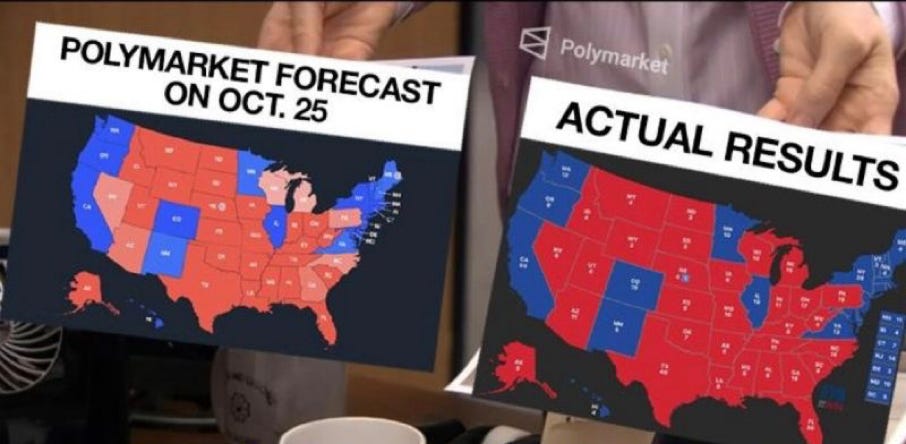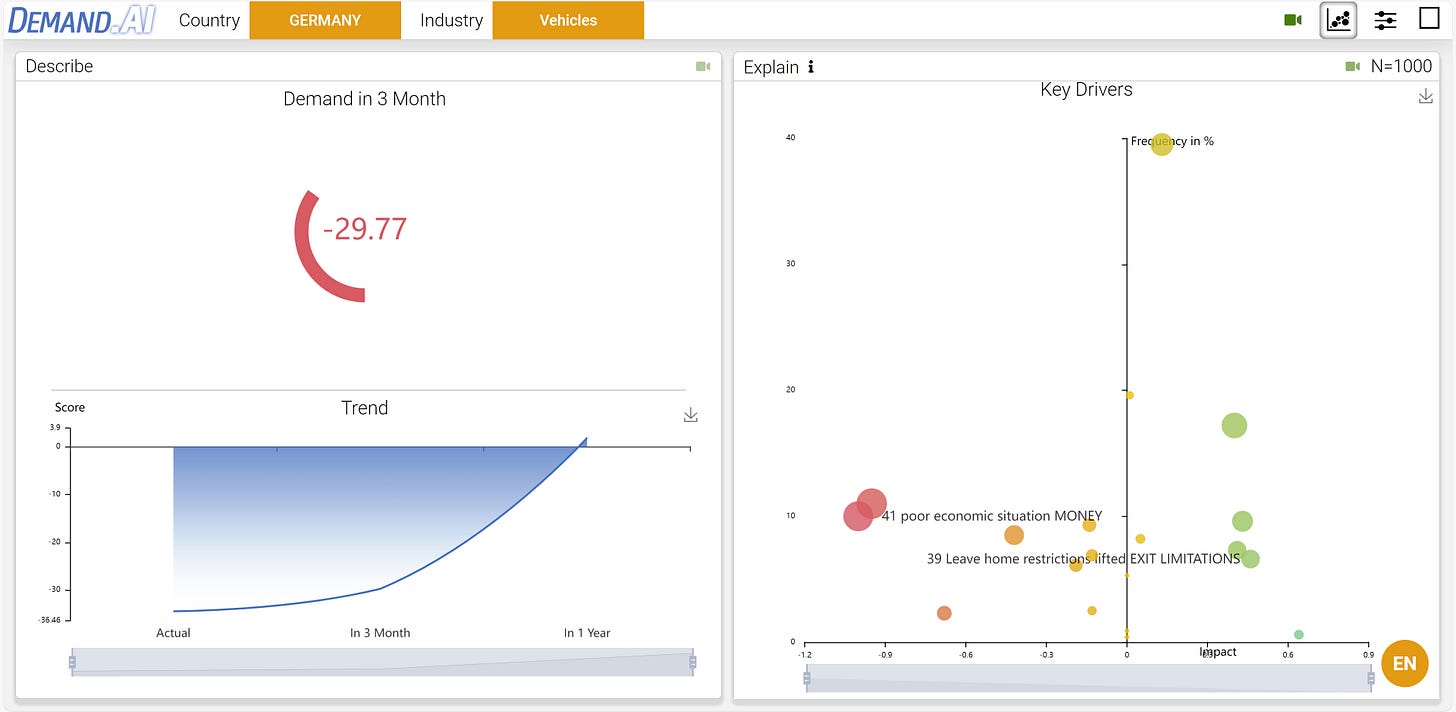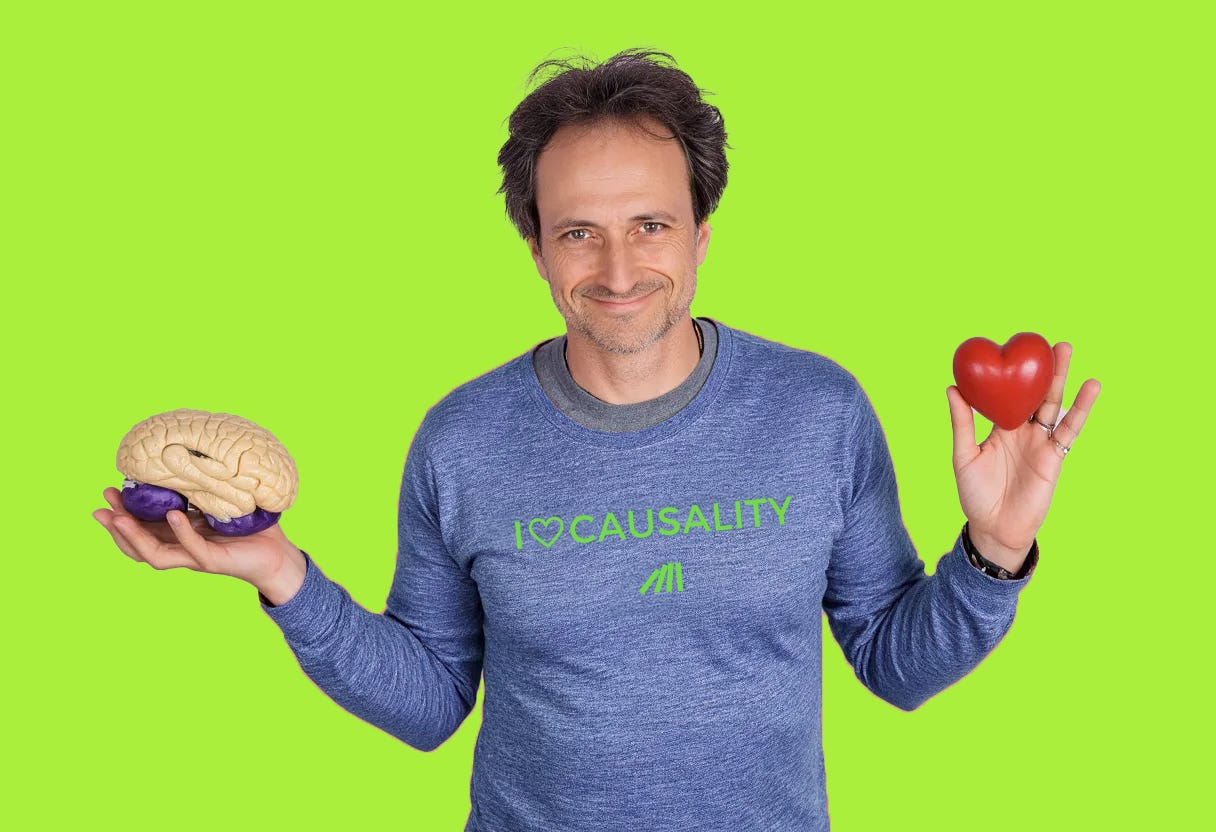10x with INTUITION research
Listen to the audio version here
To me, 'intuition' was just a fancy name for guesswork, irrationality and amateur behaviour. Now I know that by studying customers and experts intuition, we can make better predictions and explain behaviour better than ever before.
The political poll predictions in 2016 were a disaster. Nobody saw Trump winning. Now, in 2024, the pollsters were prepared. The result: Again a total failure.
Interestingly, there is a well-known method that can reduce the prediction failure rate by at least half: Prediction markets. Participants treat the election like a stock market and are asked to bet on the winner. Because of the incentive, participants are keen to be right. Participants implicitly know that they have to rely on something very powerful: their own intuition.
"Intuition is a very powerful thing, more powerful than intellect" Steve Jobs
Some argue that prediction markets are effective because of the lively exchange of information between participants. But this argument omits that voting is not a logical task. If a properly sampled survey of voters cannot resolve the answer, how can a qualitative discussion of a few dozen participants resolve it? The answer: intuition.
This image shows the impressive accuracy of a recent prediction market:
April 1, 2020 - I am sitting in my son's room, which was quickly converted into my home office when the lockdown. Sales plummeted everywhere, while some industries were flooded with demand. No one knew how long this would last. Companies were hungry for forecasts. Prediction models based on historical data and Machine Learning had become useless.
We quickly combined certain techniques to mimic prediction markets, but with results in days, not weeks: We asked respondents how much they thought demand would be down or up in 1, 3 and 12 months' time. The catch was that the faster the answer, the more intuitive and valid it was. If it took more than 2 seconds, it was counted as undecided.
"The heart has its reasons, of which reason knows nothing" Blaise Pascal - inventor of the calculus of probability
We also asked the open-ended question "please explain your answers". As with the SUPRA CX AI approach, we then categorized the text feedback. We then ran a Causal AI driver analysis to see which themes explained the inner mechanics of intuition. It turned out that the most frequently mentioned topics, such as "Corona will take a very long time", must be the result of rational, not intuitive thinking, as they neither predicted nor explained the intuitive responses of the respondents.
We didn't know how good the prediction would be, but my intuition told me it was the best thing companies could do at the moment.
History has now taught us that not only my intuition, but that of hundreds of participants, was spot on.
This is the dashboard we published at the time, with predictions and explanations for ten categories:
The Science of Intuition
Studies in chess, in handball and in golf have shown that the first intuitive strategy that comes to mind within a second or two is the most likely to succeed, while any time spent thinking about the strategy is less likely to be successful.
The effect was very high for professionals. However, it can be low for beginners with no experience. This means that intuition is not always superior. But logical thinking is not always superior either:
"Two things together cost 1.10, but one is 1 dollar more expensive than the other. According to studies, the intuitive answer to the question "How much do both things cost?" is only 21% correct, but the rational answer is only 25% correct - only insignificantly higher.
According to intuition researcher Professor Gigerenzer: "Many of the alleged 'irrationalities' that scientists have found turn out to be wise intuitions. Most of the "biases" found by behavioural scientists can be seen as truly wise heuristics, but are often dismissed as human inconsistency and inability to think logically.
There is also evidence that intuition can be powerful without prior experience, based on one of four mechanisms:
General heuristics, such as Occam's razor (the simpler explanation is true if it is similarly explanatory)
Evolutionary intuition, such as our innate fear of spiders, snakes, darkness, night and unfamiliar faces.
Collective knowledge, some implicit knowledge is passed on unconsciously in groups. Our value systems are the implicit knowledge gathered through social interactions.
Analogies: we intuitively draw analogies between domains. Many creative ideas and inventions are based on this intuitive principle.
Brands are advised to research customer intuition
Customers decide by intuition. Some say we can attribute more than 90% to it.
Market research instead speaks to the rational mind. Qual is analysing the stories customers tell. Quant is gathering opinions.
"Man is not a rational being, he is a rationalising one." Sigmund Freud
In fact, neuroscience has introduced some techniques for measuring intuition into marketing research. While laboratory techniques such as EEG and fMRT are costly and not very flexible, the Implicit Association Test (IAT) is now well established.
What we do in the IAT is measure intuition with a binary response. Yes or no. It is therefore quantitative intuition-based research.
But intuition can do more. It can give you an answer to an open question. When chess players ask themselves "What move should I make next?", they're not choosing between two or three alternatives, but from an infinite number of possibilities. And the answer appears “just that”.
Qualitative Intuition-based Research
When we invented this method in 2020 (which we called Demand AI), we didn't know that it was one of the first approaches to exploring what goes on qualitatively in the unconscious, intuitive mind.
It turns out that such a methodology has many applications, especially when we are researching something new. Think of innovation and new product research. Think of advertising and message optimisation. Think about understanding trends and new audiences.
Demand AI provides the why behind customer predictions. It can tell you whether a particular brand claim will stick and why.
But can we also ask customer intuition to CREATE a new claim for us?
At Supra, we are developing an approach we call DEEP IMPLICIT. It provides a technology-guided process to elicit respondents' intuitive truth about a question. We already built our own brand message/claim on the supra.tools website using this method. My first impression: it is amazingly powerful.
While we are exploring the technology in first pilots, I would like to keep the details under wraps for now. But if you're interested in piloting the method yourself, I'll be happy to share the details with you.
The intuitive mind is a sacred gift and the rational mind a faithful servant. We have created a society that honours the servant and has forgotten the gift" - Albert Einstein
10x with INTUITION research
Don't be deceived by the rational mind. It does not decide, nor is it the main contributor to decision making.
"But wait. Aren't you at SUPRA advocating the quant side, the use of Causal AI on data?
Yes, Causal AI uncovers which actions and circumstances lead to results. Probably the reason why Causal AI on survey data is so powerful is that it finds implicit mechanics in that data. Causal AI is really intuition research using existing quantitative data.
Like in the Demand AI example, where Causal AI finds which open-ended topics explain the intuitive decisions and which don't. It finds out which part comes from the unconscious mind and which part comes from the rationalising and narrating mind.
Use Causal AI for the data you do have. Use Intuitive Intelligence methods for the data you DO NOT have.
Prior to modelling, and even prior to a quantitative questionnaire, we gather hypotheses. Intuitive Intelligence methods help us go beyond simple expert interviews. We now get powerful hypotheses from customer and experts intuition with a simple, low-cost approach. This then feeds quantitative and causal inference.
In essence:
Consult your own intuition and the intuition of domain experts (instead of listening too much to their stories and rationales) using DEEP IMPLICIT.
Consult your customers' intuition using DEEP IMPLICIT and Demand AI.
With this rich base of hypotheses, you can proceed to collect data holistically and build powerful causal models that explain customer behaviour well.
The more unique your research question and the less data you have or can collect, the more powerful the search for research intuition will be.
And now think back and think about big victories and big failures. What insight was the basis of the win or the failure? Suddenly you realise that the right insight makes all the difference.
Research shows that the more complex and uncertain the decision problem, the more you need to harness the power of intuition.
THIS is how you 10x your insights.







